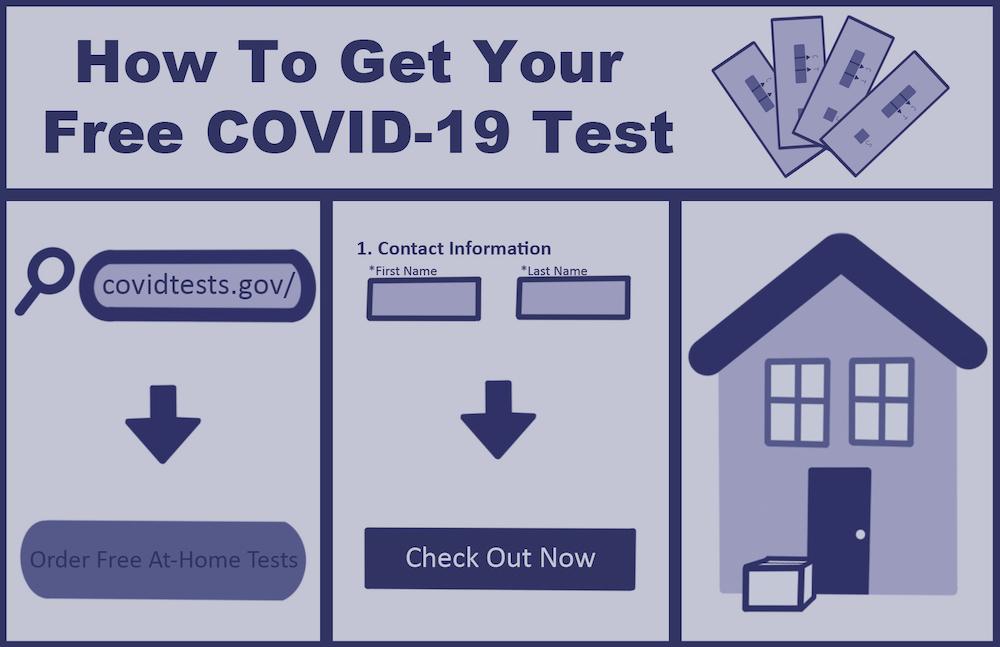Americans can now receive free COVID-19 home tests from the federal government.
On Jan. 19, the Biden administration in partnership with the U.S. Postal Service launched COVIDtests.gov, where every household can order up to four free COVID-19 tests. Tests will typically ship within seven to 12 days, the White House said in a statement.
All you’ll need to enter is your name, email and residential address. No credit card or insurance information is required. Once you have placed your order, you will receive an email confirmation from the Postal Service. To promote wider accessibility, the federal government will not process duplicate orders for the same address.
According to the website, “residential addresses known to have multiple units can order multiple tests,” which includes college dorms. However, some multi-unit buildings may not be recognized by the system so it’s important to verify that your address is recognized by the Postal Service. If you’re still experiencing issues relating to multi-unit settings, you can either file a service request or call 1-800-275-8777 and the Postal Service will help you fix the issue.
The tests provided are antigen tests, also known as rapid tests, and results are typically available in 15-30 minutes, according to the Centers for Disease Control and Prevention.
For more information, you can visit the FAQ page here.
Where else can you get free COVID-19 tests besides the federal government?
Other options to get free COVID-19 tests include MU Health Care, the Department of Health and Senior Services and from your private insurance, if you have one.
MU Health Care
In a recent press release, MU Health Care announced the opening of a new, expanded COVID-19 test collection site. The site is located at 404 N. Keene St. inside the east entrance of the Women’s Hospital and will replace the site previously located at 2003 W. Broadway. Walk-ins are available from 8 a.m. to 5 p.m. Monday through Friday and 8 a.m. to 12:30 p.m. on weekends. Appointments are not necessary, but patients won’t be accepted less than 15 minutes prior to closing. Patients must also wear a mask and bring proof of insurance. However, if you don’t have insurance, you will not be charged, media relations spokesperson at MU Health Care Eric Maze said.
Due to the recent surge in cases from Omicron, MU Health Care has experienced extremely high volumes of patients getting tested for COVID-19. Maze said during a phone call that during November 2021, MU Health Care tested an average of 500 patients per day for COVID-19. This past Tuesday it surpassed 1,200. More information on how to get test results and other answers can be found on the MU Health Care website.
DHSS drive-thru testing events
If you prefer to stay in your car, DHSS provides free COVID-19 drive-thru testing events. According to DHSS, there will be COVID-19 testing events on Feb. 1, 8, 15 and 22 between 10 a.m. and 6 p.m. These events will be held at the parking lot of Mizzou North, located at 115 W. Business Loop 70.
These events are scheduled to be outdoors unless changes are made due to inclement weather or otherwise. In such cases, updates will be posted on the DHSS website or Twitter account. These events will administer PCR tests, and patients can expect to receive results no longer than 72 hours after the event. Identifying documents are recommended but not required.
Get reimbursement from your private insurance
As part of the push to get all Americans tested, on Jan. 15 the Biden administration implemented a plan requiring all private insurance companies to cover the full cost of up to eight COVID-19 tests per month per consumer, no questions asked. Consumers can now purchase tests up to $12 by walking into participating stores or going online, and either have their tests paid for at the time of purchase or get reimbursed by submitting a claim to their insurer. More information can be found here.
As of Jan. 21, Missouri has recorded 63,174 new confirmed COVID-19 cases in the past seven days alone — an average of over 9,000 cases per day, according to data from DHSS. With the growing threat of omicron causing a spike in cases nationwide, getting tested remains key to reducing the spread of the virus.
Edited by Namratha Prasad | [email protected]








